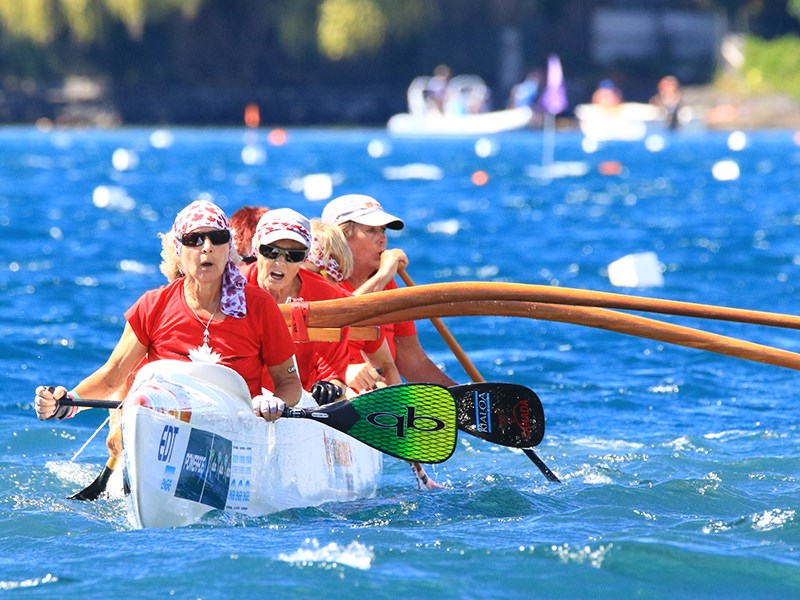When Powell River Outrigger Canoe Society set off in late July to compete in the World Outrigger Sprint Championships in Papeete, Tahiti, they had lofty goals, which they exceeded.
Local athletes came home with two gold medals, a silver medal, and broke a world record in the process. According to their coach Michael Matthews, the achievements were made in the many months of rigorous training leading up to the races.
“Paddling through the cold and the snow in the winter, that’s when they accomplished it,” he said.
The women’s crew won gold representing Canada in the masters 70+ division with a record time, and silver in the 70+ division in another race. Sue Milligan of Powell River won gold in the 70+ singles.
In the final medal standings, Canada tied for third place with Australia in the elite category and placed fourth in the club category. In a sport dominated by traditional paddling nations, Canada made waves.
“Considering Canada only had 56 athletes there, we were up on the podium a lot,” said team member Brenda Allen.
Her husband Geoff Allen agreed.
“When you’re among Tahitians, New Zealanders, Hawaiians and Australians and you hear Canada, you wonder ‘what the heck are they doing here?’” he said. “The Australians came off the water at the end of one race and said ‘we’re tired of chasing Canadians.’ They know who we are now.”
Matthews watched every race live from Powell River, wherever he happened to be.
“I was watching one of them in the Powell River library and I suspect everybody thought I was a little bit crazy,” said Matthews. “I had my earphones in and I was bouncing up and down.”
He also emailed the racers each day they were away to motivate them, according to paddler Lynette Mangan.
“It was just like him talking to us; it was incredible,” she said.
The letters of encouragement reminded the racers that it was not a superhuman effort that would achieve their goals.
“It was the rainy Friday in December, the frosty Monday in February, the hot day in May when you didn’t think you could go any further but you did,” added Mangan. “No matter how much we’d done on our own it was his coaching that took us over the top.”
In the months leading up to their competition, Matthews looked at the times achieved in the 2016 competition for the women’s respective categories. He let them know what he thought they were capable of if they put in the work, said Brenda.
“We realized what a good coach he is; he predicted that the over 70s women would have a chance at the podium and he predicted that the 60s women would be in the finals,” she added. “He nailed it, except he didn’t predict that the 70s women would break a world record. To have it come together like that was thrilling.”
Milligan said learning she won gold in the singles came as a shock.
“It was as much of a surprise to me as it was for the announcer that it was Canada,” she said.
Milligan sprained her ankle in the weeks leading up to her race and then fell ill with flu upon arriving in Tahiti.
“I couldn’t eat for two days; on the third day I could eat some rice,” she added, but she decided to go ahead and participate as the only Canadian in the race.
“I figured ‘What’s the worst that can happen? I could come last,” said Milligan. “It was about halfway through the race I realized I was staying with these women; in fact, I could pull away from them, so I did.”
Milligan took up paddling at age 52. Her last international competition was in 2008 when a few paddlers from Powell River participated, joining up with other Canadian teams.
“We did come home with three bronze medals in the different disciplines,” she said.
Ten years on and she returned home with gold.
“It is an amazing achievement, especially for Powell River. I’m hoping now we can get some support to actually get a paddling centre together,” she added. “We have so much to offer for paddling. We have so many lakes and rivers and the ocean.”
Brenda said the team purposefully chose to have the city’s name as their team name.
“We used the name Powell River for a reason, she added. “You’d hear it announced over the loudspeaker and people would ask about it. We felt like ambassadors for the city.”
For some of the athletes, discussion of the next competition is already starting.
“We’re already talking about Hilo, Hawaii, in 2020,” said Brenda. “You might as well keep the momentum going.”
Mangan said she is still on a high from the win in Tahiti and will consider that in the future.
“That’s certainly a goal, but we’ll have to see,” said Mangan. “It’s two years away and that’s a lot of work. It would be lovely to defend our position, that’s for sure.”
Matthews said the achievements of the women he coached to victory should be an inspiration to people of any age.
“Age doesn’t mean you can’t achieve physical goals,” he added. “All the women are saying they’ve been physically and mentally transformed by the process.”
Geoff said the women’s accomplishments show that setting major goals shouldn’t end at any age.
“It says wonderful things about aging and how it’s not over until it’s over,” he added. “Keep going, because if you can achieve this in your 70s, who knows what else you can do?”



